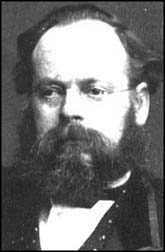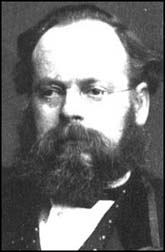Plimsoll was born in Bristol but soon moved to Whitely Wood Hall Sheffield, also spending part of his childhood in Penrith, Cumbria. Leaving school at an early age, he became a clerk at Rawson's Brewery, and rose to be manager.
In 1853 he attempted to set up in business in London as a coal merchant. He failed, and was reduced to destitution. He himself told how for a time he lived in a common lodging for 7/2d (or 7 shillings and two pence) a week.
Through this experience he learnt to sympathise with the struggles of the poor; and when his good fortune returned, he resolved to devote his time to improving their lot.
His efforts were directed especially against what were known as "coffin ships": unseaworthy and overloaded vessels, often heavily insured, in which unscrupulous owners risked the lives of their crews.
Career
In 1868, Plimsoll was elected as the Liberal Member of Parliament for Derby, and endeavoured in vain to pass a bill dealing with the subject.
In 1872 he published a work entitled "Our Seamen", which made a great impression throughout the country. Accordingly, on Plimsoll's motion in 1873, a Royal Commission was appointed, and in 1875 a government bill was introduced, which Plimsoll, though regarding it as inadequate, resolved to accept.
On 22 July, the Prime Minister, Benjamin Disraeli, announced that the bill would be dropped. Plimsoll lost his self-control, applied the term "villains" to members of the House, and shook his fist in the Speaker's face.
Disraeli moved that he be reprimanded, but on the suggestion of Lord Hartington agreed to adjourn the matter for a week to allow Plimsoll time for reflection.
Eventually Plimsoll made an apology. The country, however, shared his view that the bill had been stifled by the pressure of the shipowners, and popular feeling forced the government to pass a bill which in the following year, was amended into the Merchant Shipping Act. This gave stringent powers of inspection to the Board of Trade, and the mark that indicates the limit to which a ship may be loaded became generally known as Plimsoll's mark or line.
Plimsoll was re-elected for Derby at the general election of 1880 by a great majority, but gave up his seat to William Vernon Harcourt, believing that the latter, as Home Secretary, could advance sailors' interests more effectively than any private member.
Offered a seat by 30 constituencies, Plimsoll stood unsuccessfully in Sheffield Central in 1885. He did not re-enter the house, and later became estranged from the Liberal leaders by what he regarded as their breach of faith in neglecting the question of shipping reform.
He held for some years the honorary presidency of the National Sailors' and Firemen's Union, and drew attention to the horrors of the cattle-ships.
Later life
Later he visited the United States to try to secure the adoption of a less bitter tone towards England in the historical textbooks used in American schools. He died at Folkestone, Kent in 1898.
British writer Nicolette Jones published "The Plimsoll Sensation", a highly-acclaimed biography - getting the idea for it from living in 1995 at the Plimsoll Road in North London, but knowing hardly anything about who it was named for.
Contributor: Lesa Compston Booth (49405223)
Plimsoll was born in Bristol but soon moved to Whitely Wood Hall Sheffield, also spending part of his childhood in Penrith, Cumbria. Leaving school at an early age, he became a clerk at Rawson's Brewery, and rose to be manager.
In 1853 he attempted to set up in business in London as a coal merchant. He failed, and was reduced to destitution. He himself told how for a time he lived in a common lodging for 7/2d (or 7 shillings and two pence) a week.
Through this experience he learnt to sympathise with the struggles of the poor; and when his good fortune returned, he resolved to devote his time to improving their lot.
His efforts were directed especially against what were known as "coffin ships": unseaworthy and overloaded vessels, often heavily insured, in which unscrupulous owners risked the lives of their crews.
Career
In 1868, Plimsoll was elected as the Liberal Member of Parliament for Derby, and endeavoured in vain to pass a bill dealing with the subject.
In 1872 he published a work entitled "Our Seamen", which made a great impression throughout the country. Accordingly, on Plimsoll's motion in 1873, a Royal Commission was appointed, and in 1875 a government bill was introduced, which Plimsoll, though regarding it as inadequate, resolved to accept.
On 22 July, the Prime Minister, Benjamin Disraeli, announced that the bill would be dropped. Plimsoll lost his self-control, applied the term "villains" to members of the House, and shook his fist in the Speaker's face.
Disraeli moved that he be reprimanded, but on the suggestion of Lord Hartington agreed to adjourn the matter for a week to allow Plimsoll time for reflection.
Eventually Plimsoll made an apology. The country, however, shared his view that the bill had been stifled by the pressure of the shipowners, and popular feeling forced the government to pass a bill which in the following year, was amended into the Merchant Shipping Act. This gave stringent powers of inspection to the Board of Trade, and the mark that indicates the limit to which a ship may be loaded became generally known as Plimsoll's mark or line.
Plimsoll was re-elected for Derby at the general election of 1880 by a great majority, but gave up his seat to William Vernon Harcourt, believing that the latter, as Home Secretary, could advance sailors' interests more effectively than any private member.
Offered a seat by 30 constituencies, Plimsoll stood unsuccessfully in Sheffield Central in 1885. He did not re-enter the house, and later became estranged from the Liberal leaders by what he regarded as their breach of faith in neglecting the question of shipping reform.
He held for some years the honorary presidency of the National Sailors' and Firemen's Union, and drew attention to the horrors of the cattle-ships.
Later life
Later he visited the United States to try to secure the adoption of a less bitter tone towards England in the historical textbooks used in American schools. He died at Folkestone, Kent in 1898.
British writer Nicolette Jones published "The Plimsoll Sensation", a highly-acclaimed biography - getting the idea for it from living in 1995 at the Plimsoll Road in North London, but knowing hardly anything about who it was named for.
Contributor: Lesa Compston Booth (49405223)
Bio by: John Byrne
Advertisement
Explore more
Sponsored by Ancestry
Advertisement









